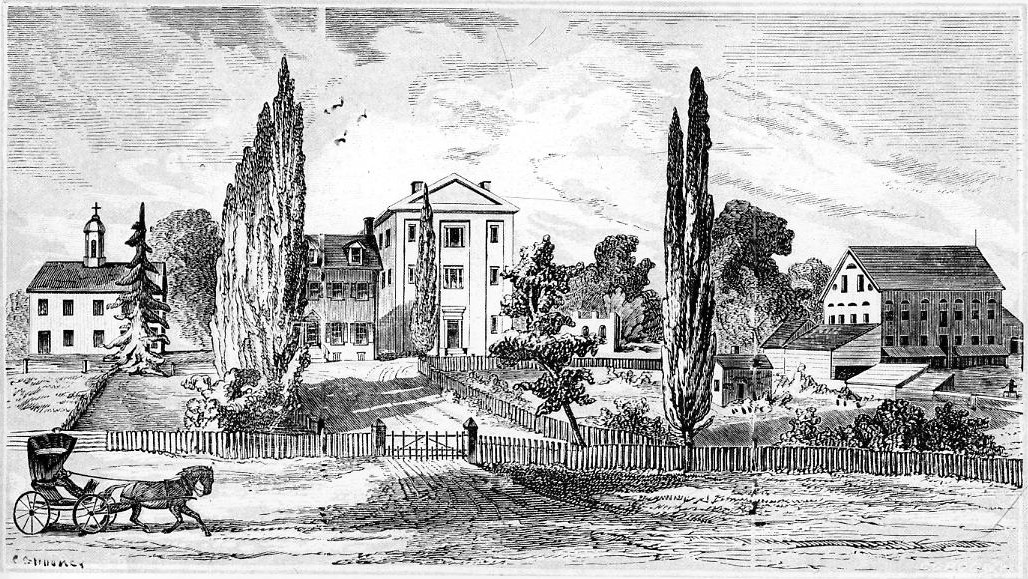|
Maureen Tilley
Maureen Tilley (1948–2016) was Professor of Early Christian History in the Theology Department of Fordham University. She was an expert on Augustine of Hippo, martyrdom, women in late antiquity, scripture, and Donatism. She was known as one of the world's most accomplished scholars of Christianity in North Africa. Education Tilley received an undergraduate degree from the University of San Francisco. She completed her doctoral studies under Elizabeth A. Clark at Duke University in 1989. Her PhD thesis was ''The Use of Scripture in Christian North Africa: An Examination of Donatist Hermeneutics.'' Research and career Tilley took her position at Fordham University in 2006. She had previously held positions at Florida State University (1989–1998) and the University of Dayton (1998–2006). In 2011, she was as the Thomas F. Martin St. Augustine Fellow at Villanova University. In the same year she was promoted to full professor. Tilley published more than 70 articles and an inf ... [...More Info...] [...Related Items...] OR: [Wikipedia] [Google] [Baidu] |
Professor
Professor (commonly abbreviated as Prof.) is an Academy, academic rank at university, universities and other tertiary education, post-secondary education and research institutions in most countries. Literally, ''professor'' derives from Latin as a 'person who professes'. Professors are usually experts in their field and teachers of the highest rank. In most systems of List of academic ranks, academic ranks, "professor" as an unqualified title refers only to the most senior academic position, sometimes informally known as "full professor". In some countries and institutions, the word ''professor'' is also used in titles of lower ranks such as associate professor and assistant professor; this is particularly the case in the United States, where the unqualified word is also used colloquially to refer to associate and assistant professors as well, and often to instructors or lecturers. Professors often conduct original research and commonly teach undergraduate, Postgraduate educa ... [...More Info...] [...Related Items...] OR: [Wikipedia] [Google] [Baidu] |
Villanova University
Villanova University is a Private university, private Catholic Church, Catholic research university in Villanova, Pennsylvania, United States. It was founded by the Order of Saint Augustine in 1842 and named after Thomas of Villanova, Saint Thomas of Villanova. The university is the oldest Catholic higher education, Catholic university in Pennsylvania and one of two Augustinian institutions of higher learning in the United States (the other being Merrimack College). The university traces its roots to the St. Augustine Church, Philadelphia, old Saint Augustine's Church, Philadelphia, which the Augustinian friars of the Province of Saint Thomas of Villanova founded in 1796, and to its parish school, Saint Augustine's Academy, which was established in 1811. It is Carnegie Classification of Institutions of Higher Education, classified among "R2: Doctoral Universities – High research activity". History In October 1841, two Irish Order of Saint Augustine, Augustinian friars from Sai ... [...More Info...] [...Related Items...] OR: [Wikipedia] [Google] [Baidu] |
2016 Deaths
This is a list of lists of deaths of notable people, organized by year. New deaths articles are added to their respective month (e.g., Deaths in ) and then linked below. 2025 2024 2023 2022 2021 2020 2019 2018 2017 2016 2015 2014 2013 2012 2011 2010 2009 2008 2007 2006 2005 2004 2003 2002 2001 2000 1999 1998 1997 1996 1995 1994 1993 1992 1991 1990 1989 1988 1987 1986 Earlier years ''Deaths in years earlier than this can usually be found in the main articles of the years.'' See also * Lists of deaths by day * Deaths by year (category) {{DEFAULTSORT:deaths by year ... [...More Info...] [...Related Items...] OR: [Wikipedia] [Google] [Baidu] |
1948 Births
Events January * January 1 ** The General Agreement on Tariffs and Trade (GATT) is inaugurated. ** The current Constitutions of Constitution of Italy, Italy and of Constitution of New Jersey, New Jersey (both later subject to amendment) go into effect. ** The railways of Britain are nationalized, to form British Railways. * January 4 – British rule in Burma, Burma gains its independence from the United Kingdom, becoming an independent republic, named the 'Post-independence Burma (1948–1962), Union of Burma', with Sao Shwe Thaik as its first President and U Nu its first Prime Minister. * January 5 – In the United States: ** Warner Brothers shows the first color newsreel (''Tournament of Roses Parade'' and the ''Rose Bowl Game''). ** The first Kinsey Reports, Kinsey Report, ''Sexual Behavior in the Human Male'', is published. * January 7 – Mantell UFO incident: Kentucky Air National Guard pilot Thomas Mantell crashes while in pursuit of an unidentified fl ... [...More Info...] [...Related Items...] OR: [Wikipedia] [Google] [Baidu] |
Duke University Alumni
Duke is a male title either of a monarch ruling over a duchy, or of a member of royalty, or nobility. As rulers, dukes are ranked below emperors, kings, grand princes, grand dukes, and above sovereign princes. As royalty or nobility, they are ranked below grand dukes and above or below princes, depending on the country or specific title. The title comes from French ''duc'', itself from the Latin '' dux'', 'leader', a term used in republican Rome to refer to a military commander without an official rank (particularly one of Germanic or Celtic origin), and later coming to mean the leading military commander of a province. In most countries, the word ''duchess'' is the female equivalent. Following the reforms of the emperor Diocletian (which separated the civilian and military administrations of the Roman provinces), a ''dux'' became the military commander in each province. The title ''dux'', Hellenised to ''doux'', survived in the Eastern Roman Empire where it continued i ... [...More Info...] [...Related Items...] OR: [Wikipedia] [Google] [Baidu] |
Women Classical Scholars
A woman is an adult female human. Before adulthood, a female child or adolescent is referred to as a girl. Typically, women are of the female sex and inherit a pair of X chromosomes, one from each parent, and women with functional uteruses are capable of pregnancy and giving birth from puberty until menopause. More generally, sex differentiation of the female fetus is governed by the lack of a present, or functioning, '' SRY'' gene on either one of the respective sex chromosomes. Female anatomy is distinguished from male anatomy by the female reproductive system, which includes the ovaries, fallopian tubes, uterus, vagina, and vulva. An adult woman generally has a wider pelvis, broader hips, and larger breasts than an adult man. These characteristics facilitate childbirth and breastfeeding. Women typically have less facial and other body hair, have a higher body fat composition, and are on average shorter and less muscular than men. Throughout human history ... [...More Info...] [...Related Items...] OR: [Wikipedia] [Google] [Baidu] |
Susan Ashbrook Harvey
Susan Ashbrook Harvey (born 1953) is the Royce Family Professor of Teaching Excellence and the Willard Prescott and Annie McClelland Smith Professor of History and Religion at Brown University. She specializes in late antique and Byzantine Christianity, with Syriac studies as her particular focus. Career Harvey was born Susan Jean Ashbrook in 1953 in Rochester, New York to a Baptist seminary professor. She cites her Christian upbringing as a source of inspiration for her research. Harvey received her BA in Classics from Grinnell College in 1975. In 1977, she followed this with a Master of Letters in Byzantine studies from the University of Birmingham and then a PhD at the same institution in 1982. Her thesis was supervised by Sebastian Brock, one of the foremost experts in the Syriac language and a source of inspiration for Harvey's later interest in Syriac Christianity. From 1983 to 1987, she was Assistant Professor of Religious Studies at the University of Rochester. In 1987, ... [...More Info...] [...Related Items...] OR: [Wikipedia] [Google] [Baidu] |
Patricia Cox Miller
Patricia Cox Miller is an American religion academic. She is the (Bishop) W. Earl Ledden Professor Emerita of Religion at Syracuse University. She researches religious imagination in late antiquity, religion and aesthetics in late antiquity, early Christian asceticism, women and religion in late antiquity, early Christian and pagan hagiography and ancient art. Education Miller completed her BA in history at Mary Washington College of University of Virginia in 1969. She then did a year of Special Study at the Hebrew University of Jerusalem in Israel from 1969 to 1970. Following this she completed an MA in the History of Christianity at the University of Chicago in 1972 and her Ph.D., also at the University of Chicago, on Religion in Late Antiquity in 1979. Career Miller spent a year as an Assistant Professor of Religion at the University of Washington from 1975 to 1976, before moving to New York and rising through the ranks of the Department of Religion at Syracuse University f ... [...More Info...] [...Related Items...] OR: [Wikipedia] [Google] [Baidu] |
North American Patristics Society
North is one of the four compass points or cardinal directions. It is the opposite of south and is perpendicular to east and west. ''North'' is a noun, adjective, or adverb indicating direction or geography. Etymology The word ''north'' is related to the Old High German ''nord'', both descending from the Proto-Indo-European unit *''ner-'', meaning "left; below" as north is to left when facing the rising sun. Similarly, the other cardinal directions are also related to the sun's position. The Latin word ''borealis'' comes from the Greek ''boreas'' "north wind, north" which, according to Ovid, was personified as the wind-god Boreas, the father of Calais and Zetes. ''Septentrionalis'' is from ''septentriones'', "the seven plow oxen", a name of ''Ursa Major''. The Greek ἀρκτικός (''arktikós'') is named for the same constellation, and is the source of the English word ''Arctic''. Other languages have other derivations. For example, in Lezgian, ''kefer'' can mean both ... [...More Info...] [...Related Items...] OR: [Wikipedia] [Google] [Baidu] |
University Of Dayton
The University of Dayton (UD) is a Private university, private, Catholic research university in Dayton, Ohio, United States. Founded in 1850 by the Society of Mary (Marianists), Society of Mary, it is one of three Marianist universities in the US and the second-largest private university in Ohio. Its campus is located in southern Dayton and spans 388 acres on both sides of the Great Miami River. The campus is noted for the Immaculate Conception Chapel and the University of Dayton Arena. As of 2023, the university enrolls approximately 11,300 undergraduate and postgraduate students from a variety of religious, ethnic and geographic backgrounds. It offers more than 80 academic programs in the arts, sciences, business, education, health sciences, engineering, and law. In 2009, UD offered what it believes to be one of the first undergraduate degree programs in human rights. It is Carnegie Classification of Institutions of Higher Education, classified among "R1: Doctoral Universities ... [...More Info...] [...Related Items...] OR: [Wikipedia] [Google] [Baidu] |
Early Christianity
Early Christianity, otherwise called the Early Church or Paleo-Christianity, describes the History of Christianity, historical era of the Christianity, Christian religion up to the First Council of Nicaea in 325. Spread of Christianity, Christianity spread from the Levant, across the Roman Empire, and beyond. Originally, this progression was closely connected to History of the Jews in the Roman Empire, already established Jewish centers in the Holy Land and the Jewish diaspora throughout the Eastern Mediterranean. The first followers of Christianity were Jews who had Proselyte, converted to the faith, i.e. Jewish Christians, as well as Phoenicia, Phoenicians, i.e. Christianity in Lebanon, Lebanese Christians. Early Christianity contains the Apostolic Age and is followed by, and substantially overlaps with, the Patristic era. The Apostolic sees claim to have been founded by one or more of the Apostles in the New Testament, apostles of Jesus, who are said to have Dispersion of the A ... [...More Info...] [...Related Items...] OR: [Wikipedia] [Google] [Baidu] |




